FORT MEADE, Md. - "I just allow the emotion to flow through me. The part that makes me self-conscious is that people are watching me while it happens. It's a very intimate experience. You have to bare your soul, and putting yourself in such a vulnerable position requires you to get outside your comfort zone and take risks."
These words, so eloquently, so honestly, put by Maj. Bruce Pulver, deputy commander and associate conductor of The United States Army Field Band, were spoken as he described the feeling of being on stage in front of a large audience conducting a group of extraordinary musicians.
The risks Pulver touches on are not life threatening, but they are very real, and they can be extremely difficult to overcome, particularly for someone like Pulver.
He is introverted.
What's even more shocking is that all of the Field Band officers share that same characteristic!
They're not accountants, but their jobs are very taxing ...
It's hard to believe that Col. Thomas Palmatier, Maj. Bruce Pulver, Capt. Leonel PeAfA+-a, Capt. Sharon Toulouse and Chief Warrant Officer Gordon Kippola are all introverts, particularly given their chosen Army career field ... one calling for the necessity to communicate and connect with hundreds, sometimes thousands, of people at any given moment.
At some point in their lives, they have each taken the Myers-Briggs personality test, and each of their tests resulted in a personality profile that begins with the letter "I" for introvert.
Knowing that these five officers are motivated by their inner worlds is an eye opener.
For introverts, it is not inherent to want to interact with people all the time. Yet, during the Field Band performances all over the world, these conductors are very down to earth, extremely approachable and constantly sharing stories, sharing themselves, with concert goers.
However, once they step off the stage, it is another story, one that an extrovert would find hard to believe.
Kippola, the director of the Jazz Ambassadors-America's Big Band, explains, "It takes an extraordinary amount of energy to perform night after night. Not only do we conduct the band, but we are also talking with the audience, both on- and off-stage. After each performance, I tend to retreat to my personal space as soon as I can. I'm not necessarily looking for 'me' time. I just need time to recharge from experiencing what I consider to be social overload."
Toulouse, the Field Band's administrative officer, agrees that personal refuge is a high commodity for introverts, but she quickly points, "We introverts seek our private sanctuaries not because we are shy, though some introverts may very well be withdrawn. For us, interacting with others is, simply, draining."
Despite the emotional drain of performing in public, for the most part, each of them has developed a method in which to deal with any nervousness experienced when walking onto the stage in front of a sea of people.
Palmatier, the commander and conductor of The U.S. Army Field Band, is the first to admit that he, even to this day, is a bit uneasy at times, particularly if he feels unprepared.
"I try to get focused in advance and sort of psych up for it. If I'm preoccupied with other tasks and just walk out there without proper mental preparation, it can be very uncomfortable," Palmatier noted.
Kippola echoed those sentiments.
"It has become routine. I typically focus on contemplating what I intend to say to the audience, what I intend to communicate to concert goers about the Jazz Ambassadors, the Field Band, and the Army," he said.
PeAfA+-a, the director of the Soldiers' Chorus, says he typically does not experience anxiety, but confesses there have been a few times he hasn't felt completely confident, citing that he, too, ensures he is prepared.
For Toulouse, any distress she faces tends to stem from the relationship with the musicians rather than standing in front of an audience.
"I'm more uncomfortable stepping in front of a group of musicians for the first time. Most bands are skeptical about a new conductor, and you really have to prove yourself to them and earn their trust, their respect. Music is a very personal thing and conducting is even more so as you are leading a group of others to create the music," she noted.
Toulouse also mentioned that, as a conductor, as an officer, building a strong relationship with the musicians can be difficult in the Army bands program due to the frequent rotations of conductors who are regularly reassigned just like any other Soldier.
She has become accustomed to stepping outside the comfort zone and donning a podium face-it has become a part of the routine.
Pulver agrees.
"It's almost like being an actor. I'm not an extrovert, but I play one on stage," he chuckled.
The show must go on ...
In a world, an inner world, where silence is a commodity, it's an obvious notion to wonder why these five Soldier-musicians chose a career founded on community outreach.
Before becoming an Army bands officer, Toulouse had considered working as a veterinary assistant or office manager of some sort. But she, the daughter of a church organist and school music teacher, she, who recalls dancing around the house to musical soundtracks, could not subdue the calling of music.
Toulouse taught high school and beginning band for five years in Lawrence, Kan., and fondly recalls the mixture of music and teaching.
"The kids can be very fun to work with and the excitement they exude when learning new things is intoxicating! The band staff was such a tight knit group ... supportive, fun, crazy and talented. I miss that interaction with both the kids and my co-workers," she exclaimed.
Toulouse doesn't consider herself drawn to the stage. She remembers playing her trumpet at her church when she was a seventh-grade student.
"I was nervous but excited. I loved it afterwards, but I'm kind of an oxymoron if you will. I strive for attention, but am really uncomfortable with the attention when I DO get it," she said.
Kippola, too, did not immediately seek an education in music. He only did so after "failing miserably in my classes designed for pre-med students."
Despite the fact he is introverted, he has loved the stage, loved music as far back as he can recollect.
"I first took the stage when I was 5 or 6 years old to sing a duet with my dad in church. I don't think I was nervous then, either. I know I didn't choose to be an introvert. I think it is something you are born with. In elementary school, I remember wishing I was extroverted, for it was those kids, the outgoing ones, who were popular. I was neither-extroverted or popular. That doesn't mean I didn't, and still don't, enjoy the spotlight," he reminisced.
And, enjoy the spotlight he does. Kippola is known throughout the Field Band for his poetic prowess and is continuously sought for his ability to provide comic relief through his authoring, and delivery, of funny, witty odes.
PeAfA+-a's contemplated careers beyond the scope of music altogether, namely careers in law enforcement, aviation and medicine. Rightfully so-his description of his first stage performance would make anyone wince at the thought of having a career where performing for an audience is required.
"I was about 3 or 4 years old. I was singing a concert in a children's choir, and it was not by choice. There were about 20 or so kids. I did NOT want to be in the spotlight. I didn't like all eyes on me. I was terrified. I didn't understand why my Mother put me in a situation where everyone was staring at me. Needless to say, I stood there, scared, and I didn't sing. I just kept looking at all those eyes looking back at me, and looking to my Mother to come rescue me as soon as possible. I am pretty sure I was the only one who did that," he said.
Palmatier, too, finds a variety of careers interesting. But, unlike the others, he has consistently gravitated toward a career in music.
In fact, throughout his 32-year Army career, he said that whenever he held a position that didn't involve performing, he was "drawn to doing whatever type of music performance I could find."
Palmatier has enjoyed performing, even as a child. He recalls being nervous at the onset periodically, but says that over the years it has become "something of an out of body experience" that, to him, was liberating.
Marching to the beat of their own drum ...
The officers call the second floor of the Field Band hall at Fort Meade home. They occupy primarily one side of the floor, which is laughingly referred to as the "hall of power" by some of the Soldiers.
Often, doors will be left ajar, enough to hear classical music emanating from the rooms, enough to notice an officer rehearsing and stick (baton) techniques in mirrors.
The "hall of power" can be eerily quiet at times. Sometimes the silence is a result of all four Field Band components-the Concert Band, the Soldiers' Chorus, the Jazz Ambassadors and The Volunteers-are busy touring America, engaged in telling the Army story to audiences across the Nation.
And, at other times, it is just ... quiet ... for the officers have found solace in their personal spaces.
In their spare time, the time they are afforded away from performing with the Field Band, they share another commonality, one that should come as no surprise.
Their chosen activities, their chosen hobbies, are those designed to be enjoyed alone.
"I enjoy reading, exercising, and just hanging around home. Lately, I have been experimenting with various types of bird feeders and food to attract different types of birds and just watching them interact," mentioned Palmatier.
PeAfA+-a says that he likes both creative and analytical things from cooking and baking to learning new ideas in the realms of finance and astronomy.
Pulver confesses that he prefers to catch a newscast vice listening to more music in his time away from the office.
"I have actually thought about doing something in the theater again-acting, directing, producing-anything where I can unleash my creativity," said Kippola, and he added, "it does not always have to be related to music."
Toulouse, who tends to gravitate toward athletic activities in her leisure time, also admits to the joy she experiences in performing these days in a few, local ensembles, but not as a conductor.
Much like she did in her church as a seventh-grader, she enjoys playing her trumpet, something she doesn't get to do as much since becoming a conductor, for "playing with these groups reminds me what it's like to be on the OTHER side of the podium."
About The United States Army Field Band:
The U.S. Army Field Band, The Musical Ambassadors of the Army, has performed for more than 100 million people worldwide for more than 60 years. As the premier touring musical representative for the United States Army, these Soldiers representing Soldiers tell the Army story through music and keep the will of the American people behind the members of our armed forces. This internationally-acclaimed military unit is comprised of noncommissioned officers who exemplify a true commitment to service to our Nation and illustrate why the secretary of the Army dedicated 2009 as the Year of the NCO.
Go to www.armyfieldband.com to learn more about The United States Army Field Band.
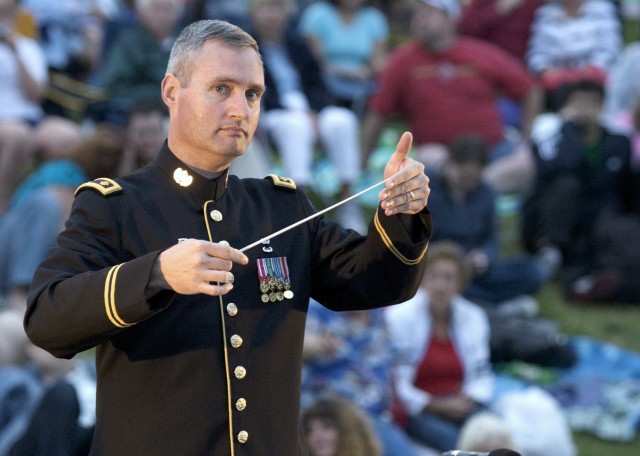
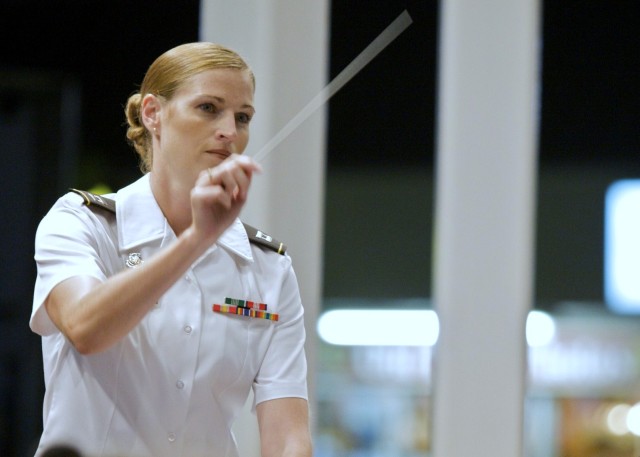
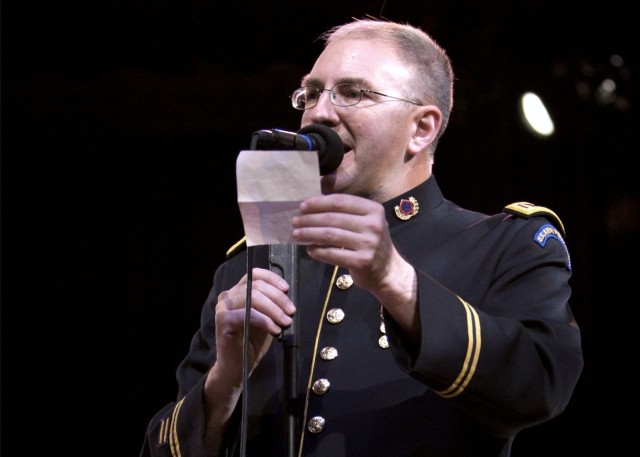
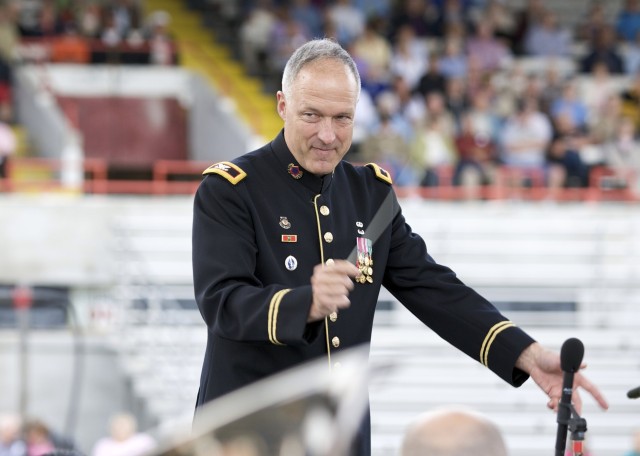

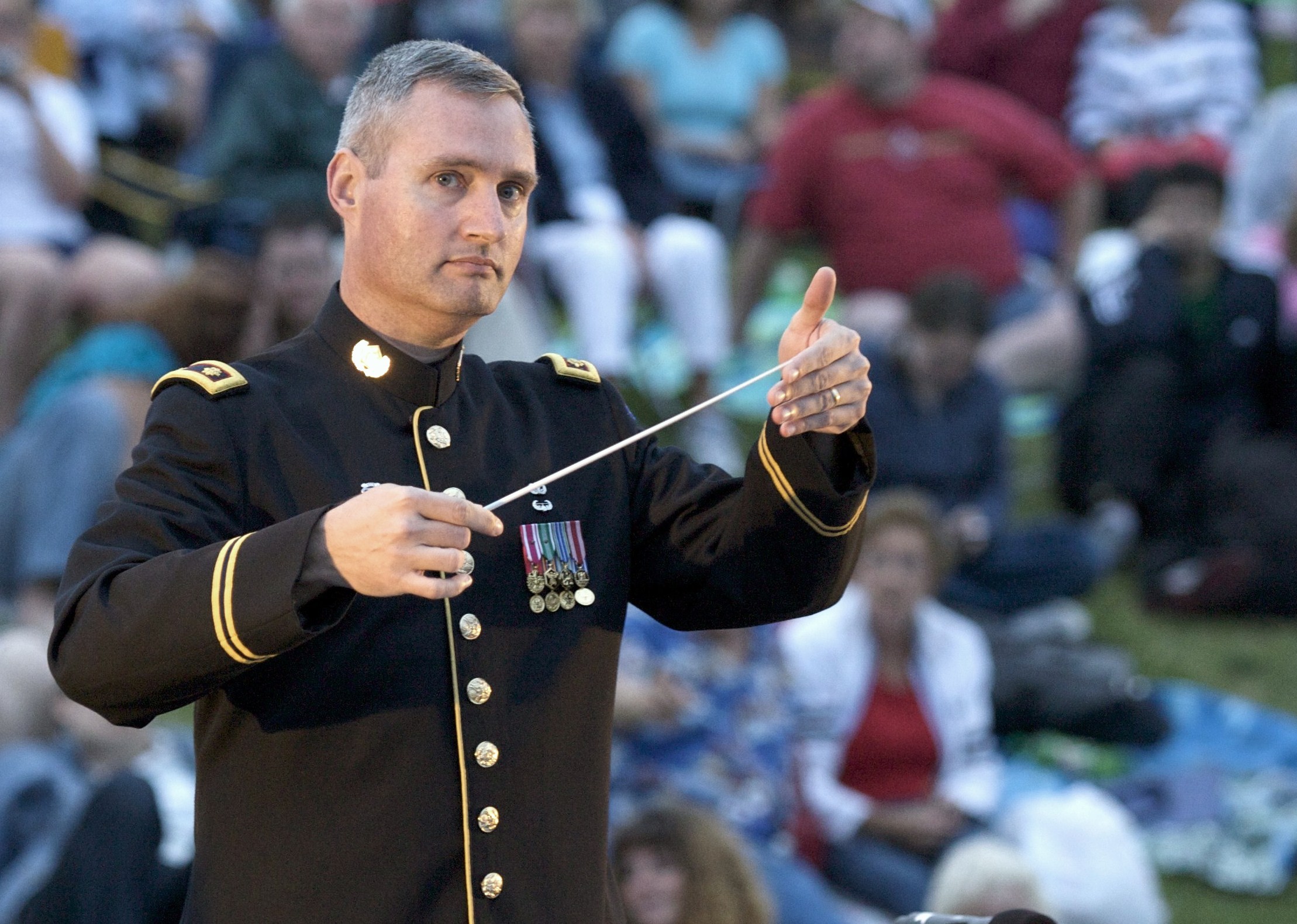
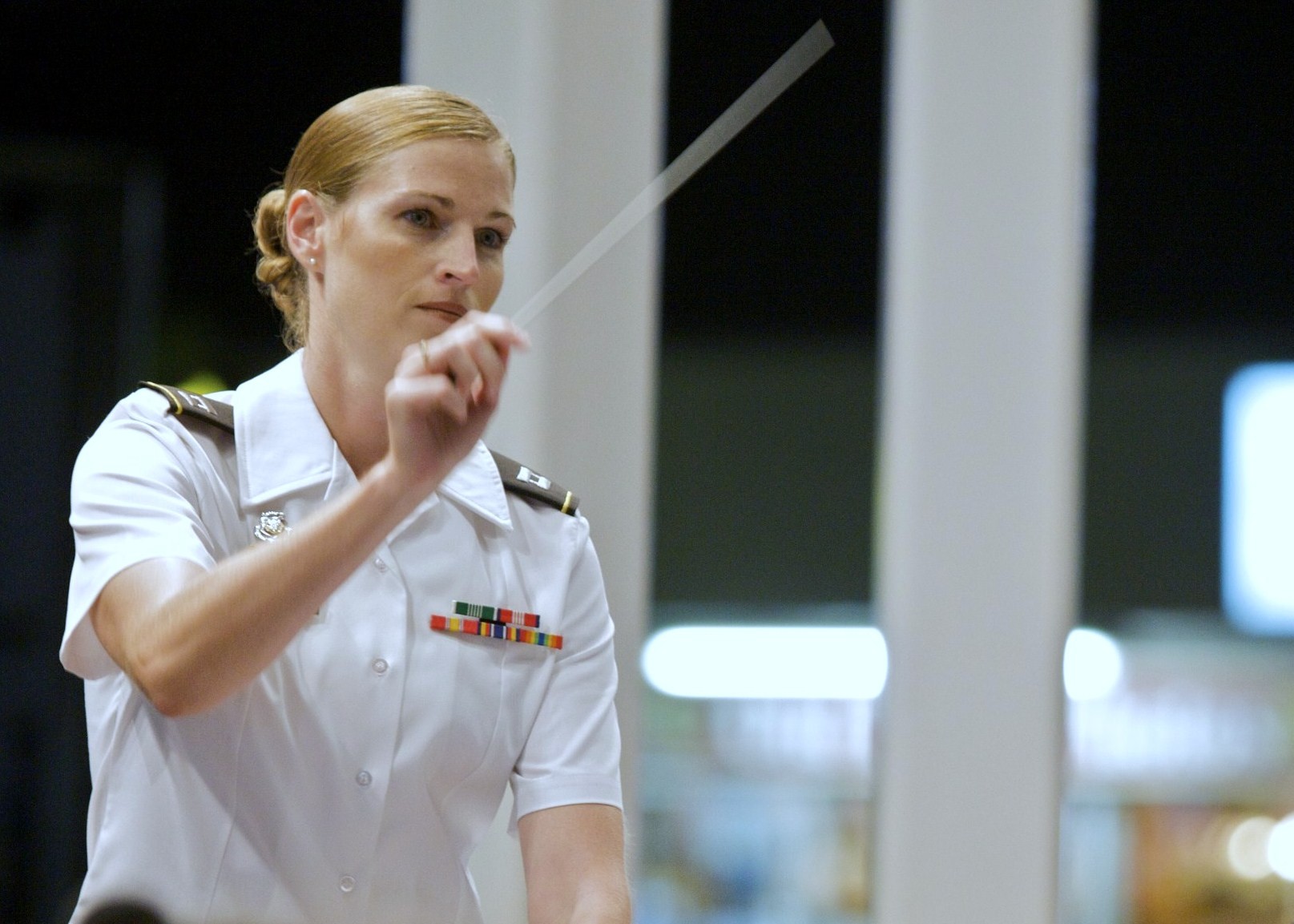
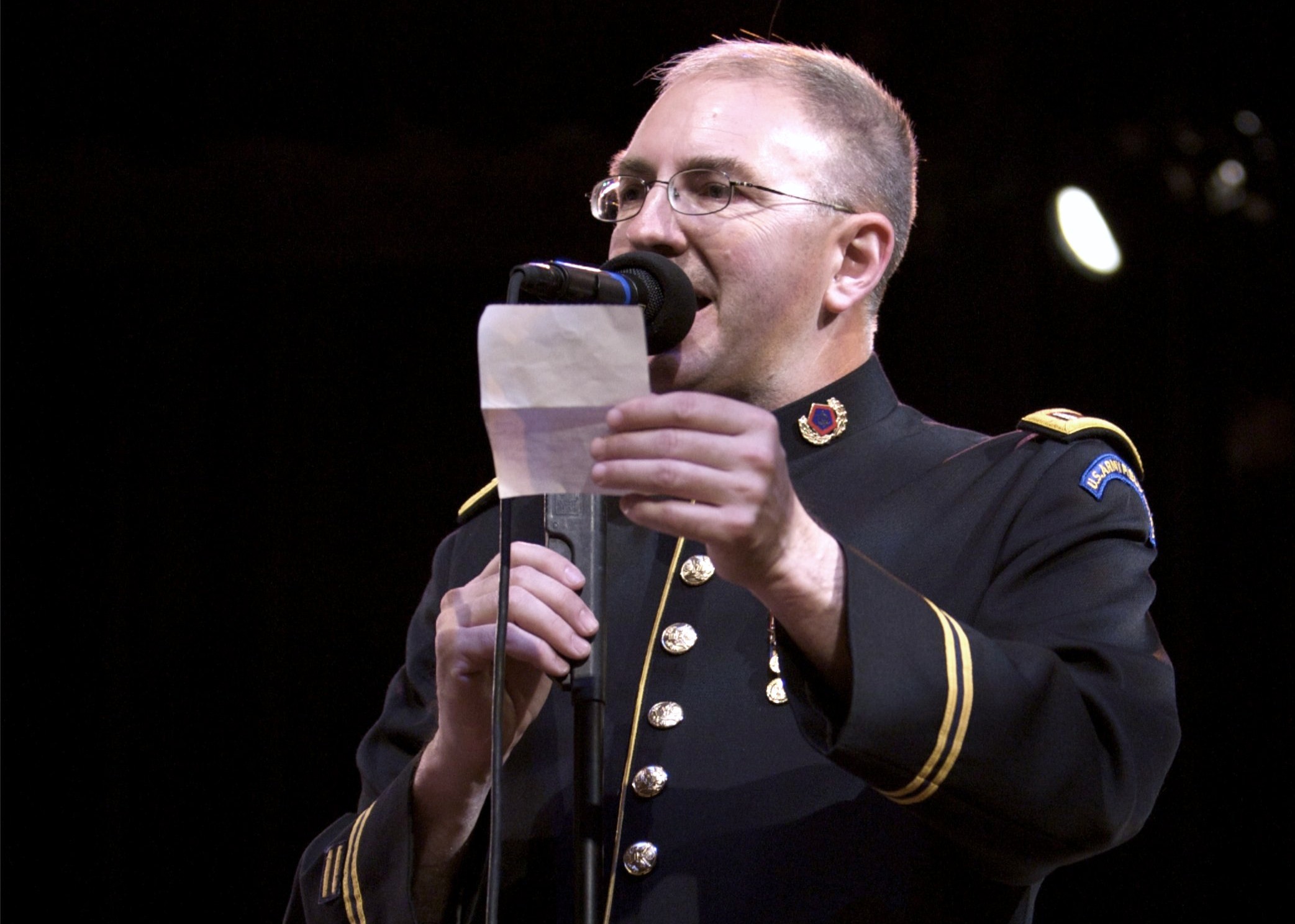
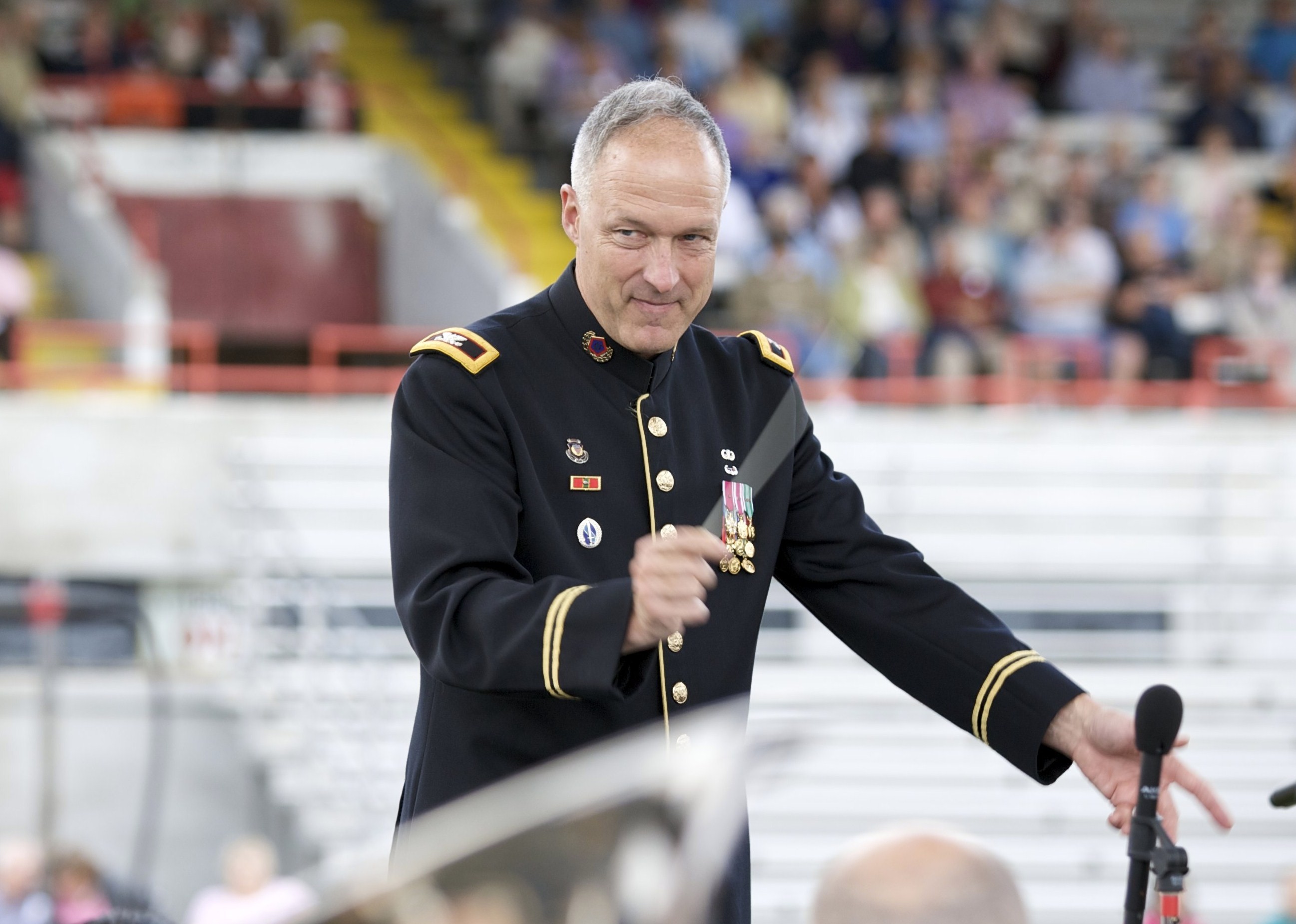

Social Sharing